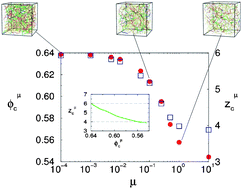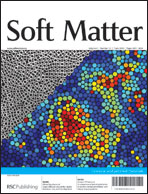Jamming of frictional spheres and random loose packing†
Abstract
The role of the friction coefficient, μ, on the jamming properties of disordered, particle packings is studied using computer simulations. Compressed, soft-sphere packings are brought towards the jamming transition—the point where a packing loses mechanical stability—by decreasing the packing fraction. The values of the packing fraction at the jamming transition, ϕμc, gradually decrease from the random close packing point for zero friction, to a value coincident with random loose packing as the friction coefficient is increased over several orders of magnitude. This is accompanied by a decrease in the coordination number at the jamming transition, zμc, which varies from approximately six to four with increasing friction. Universal power law scaling is observed in the pressure and coordination number as a function of distance from the generalised, friction-dependent jamming point. Various power laws are also reported between the ϕμc, zμc, and μ. Dependence on preparation history of the packings is also investigated.

- This article is part of the themed collection: Granular and jammed materials

 Please wait while we load your content...
Please wait while we load your content...